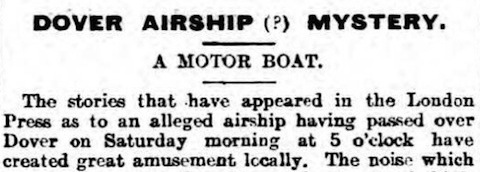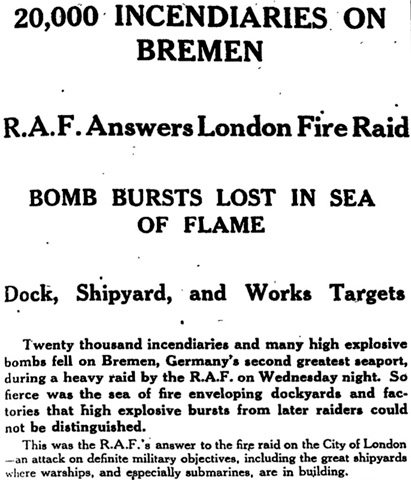
A number of newspapers print articles of varying length about the Dover airship mystery today, including the Yeovil Western Gazette, the Exeter Western Times, and the Lichfield Mercury. None of these add any new information about this incident, one being a reprint of an article already published in another newspaper and the other two simply terse summaries. However, the Dover Express and East Kent News (p. 2; above) has a local, and very sceptical, slant, saying the story has caused 'great amusement locally' where the true cause is known:
The noise which one or two people thought was due to an airship's engines was due to the exhaust of Mr. Walker's new motor boat, 'The Sappho.' The engines of this boat at the present time have no silencer, and made a great deal of noise, although no one acquainted with an airship's engine would confuse the two. On Saturday morning, at 5 o'clock, this boat was coming in harbour, and the noise was undoubtedly caused by it.
So that would appear to be that.
The Mercury also has a paragraph about the lights seen lately over the Bristol Channel -- though from the Welsh side this time, not the English one: 'from Dinas Powis between ten and eleven o'clock one evening recently' (p. 7). They were seen 'above Nell's Point, Barry, and Lavernock, two of the most important in the chain of forts which form the Bristol Channel defences'. Two lights were seen, which reminded the (unnamed) observers of 'aceytlene' [sic]:
They were watched for a long time, moving to and fro in the sky above the coast near Lavernock, and after about an hour they moved off in a westerly direction. They are believed to have come from a dirigible airship or an aeroplane, but most probably from the former as they did not appear to move quickly.
The Mercury points out that 'the Bristol Channel forts are of the utmost strategic importance', because 'in the event of an outbreak of war, the chief coal shipping ports must rely [upon them] for defence against a sudden raid from a foreign Power'. Ominous.
![]() This work is licensed under a Creative Commons Attribution-NonCommercial-NoDerivatives 4.0 International License.
Permissions beyond the scope of this license may be available at http://airminded.org/copyright/.
This work is licensed under a Creative Commons Attribution-NonCommercial-NoDerivatives 4.0 International License.
Permissions beyond the scope of this license may be available at http://airminded.org/copyright/.





Pingback:
Saturday, 18 January 1913
Pingback:
Tuesday, 21 January 1913
Pingback:
Thursday, 23 January 1913
Pingback:
Wednesday, 22 January 1913
Pingback:
Saturday, 11 January 1913
Pingback:
Friday, 7 March 1913